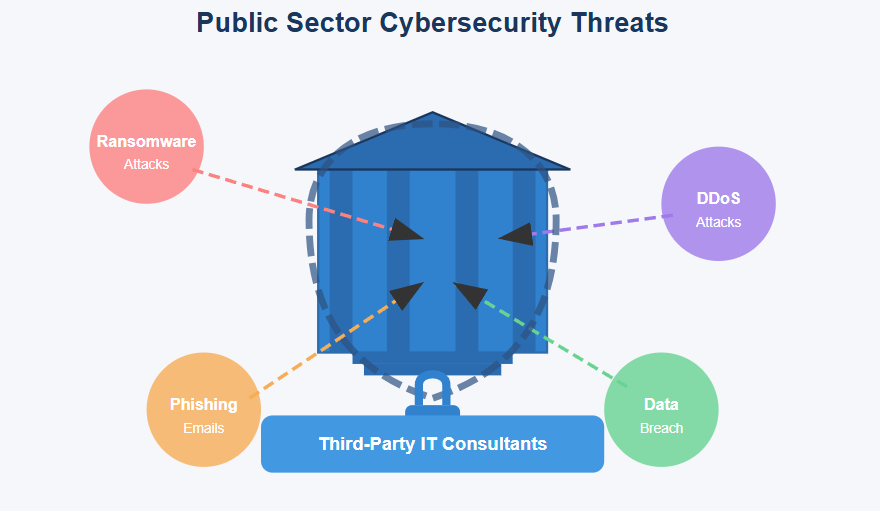The growing threat to UK Public Sector
Public sector cybersecurity has become a critical concern as attacks increase in frequency and sophistication. Government organisations face relentless threats from cybercriminals who target both data and essential systems. These attacks aim to disrupt services, steal sensitive information, and create leverage for financial or political gain.
Recent statistics paint a concerning picture. The National Audit Office (NAO) found that in 2024, 58 critical government IT systems with major security gaps. Another 228 legacy IT systems remain vulnerable to attacks. These weaknesses create opportunities for cybercriminals to exploit.

Recent major attacks show the scale of the problem
The scale of attacks against public bodies continues to grow at an alarming rate. HMRC blocked 105 million malicious emails over just three years. This number jumped from 23.7 million to 40.3 million in a single year, showing the persistence of attackers.
NHS cybersecurity was severely tested during the Synnovis ransomware attack in June 2024. This attack caused widespread disruption to London hospitals. Over 10,000 outpatient appointments and 1,700 elective procedures were postponed. The impact on patient care was immediate and significant.
The British Library suffered a major attack in October 2023. The Rhysida ransomware gang, believed to be Russian-backed, compromised most online systems. They gained access through a virtual private network that lacked multi-factor authentication. Legacy IT systems security issues allowed attackers wider access and slowed recovery efforts.
Key vulnerabilities in Public Sector organisations
Several factors make public sector organisations attractive targets for cybercriminals:
- Legacy systems: Outdated technology lacks modern security features and receives fewer updates.
- Budget constraints: Limited funding restricts investment in security tools and infrastructure.
- Skills shortage: One-third of government cybersecurity positions remain vacant or filled by temporary staff.
- Valuable data: Public bodies hold sensitive personal and financial information worth selling.
- Essential services: Disrupting critical services creates pressure to pay ransoms quickly.
Cyber security professionals are in high demand across all government departments. The skills gap makes it difficult to maintain adequate protection against evolving threats.

The role of third-party IT consultants
Many organisations turn to specialised cybersecurity services to address these challenges. As AJ Thompson, CCO at Northdoor plc, explains:
“The key to keeping the back-door locked is having an overview of the possible vulnerabilities that lie within your systems. For most public sector organisations who are facing financial pressures and a noticeable skills gap, this seems like an impossible task.”
Third-party cybersecurity consultants offer several advantages:
- Specialised expertise: Access to professionals with current knowledge of threats and defences.
- Comprehensive assessment: Complete view of system vulnerabilities across the organisation.
- 24/7 Monitoring: Constant protection against threats that can emerge at any time.
- Staff Training: Help internal teams develop skills to detect and respond to risks.
- Cost Efficiency: More affordable than hiring full-time security specialists.
Every public sector organisation needs a clear cybersecurity strategy to address emerging threats. External consultants can help develop and implement these strategies effectively.
Building stronger defences
The cost of cyber attacks extends beyond immediate disruption. The British Library has already spent £600,000 rebuilding its services after the attack. The final cost will likely be much higher.
A hypothetical attack on energy services in Southeast England could cost the UK economy £49 billion. This shows the potential scale of damage from successful attacks on critical infrastructure.
Effective cybersecurity requires constant vigilance and regular system updates. Public sector organisations must:
- Assess current vulnerabilities: Identify weak points in systems and processes.
- Develop response plans: Create clear procedures for handling security incidents.
- Train staff: Ensure all employees understand security risks and best practices.
- Update legacy systems: Prioritise modernisation of outdated technology.
- Consider external support: Engage specialised security partners when needed.
Conclusion
Public sector cybersecurity remains under serious threat from determined attackers. The combination of valuable data, essential services, and system vulnerabilities creates an attractive target.
Organisations facing budget constraints and skills shortages can benefit from third-party security expertise. These partnerships provide comprehensive protection and help build long-term security capabilities.
Third-party IT consultants can provide a 360-degree, 24/7 overview of public sector systems. They have teams of experts who can supplement internal teams, allowing for a comprehensive view of where vulnerabilities lie.
By taking a proactive approach to security, public sector organisations can better protect their systems, data, and the essential services they provide to citizens.